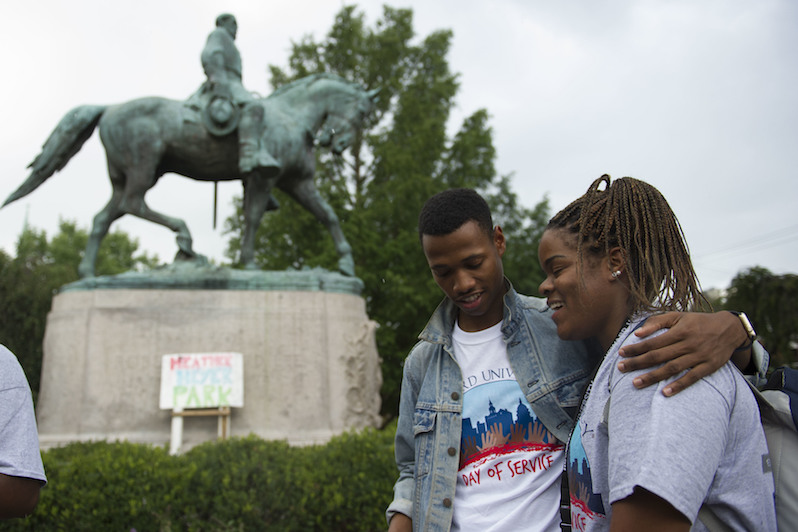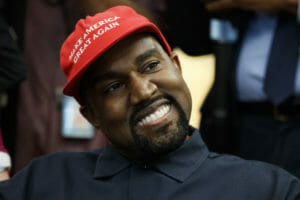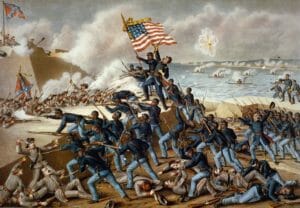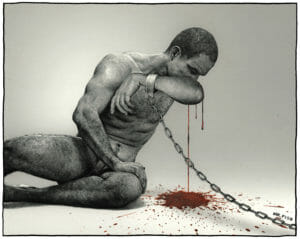Racial Justice Must Be Central to Our Movements
Better late than never for the “white left” to begin understanding the importance of racial justice. Howard University student Troy Duffie with fellow student Kaylah Clark near the statue of Confederate Gen. Robert E. Lee in Charlottesville, Va., last week. Some 50 Howard students visited the statue and the site where Heather Heyer was killed while she was protesting a white nationalist rally Aug. 12. (Cliff Owen / AP)
Howard University student Troy Duffie with fellow student Kaylah Clark near the statue of Confederate Gen. Robert E. Lee in Charlottesville, Va., last week. Some 50 Howard students visited the statue and the site where Heather Heyer was killed while she was protesting a white nationalist rally Aug. 12. (Cliff Owen / AP)
If progressives are to learn one lesson about American politics in the period between last November’s election and the recent Charlottesville, Va., clashes, let it be this: To win social progress on many fronts at once, we have to address racism first and foremost. That’s because this nation was founded on the white domination of people of color, and especially African-Americans and Native Americans.
Until we collectively face this fact and work for a redress of the impacts of persistent and relentless racism, we will continue to witness the emergence of white populist racists like Donald Trump and the resurgence of white supremacist and Nazi groups. Meanwhile, a minority of wealthy elites will continue to laugh all the way to the bank, smug over having avoided blame for capitalism’s built-in failings once again.
There is no better symbolism of our failure to address the horrors of slavery and Jim Crow segregation than the current controversy over Confederate statues. Yohuru Williams, history professor and dean of the University of St. Thomas’ College of Arts and Science, explained to me in an interview that many Confederate statues were not erected before or during the Civil War but soon after, “by groups like the Daughters of the Confederacy, who were doing this to commemorate a lost cause—the idea that the South would rise again.” A number of statues were erected even later, “during the height of the civil rights movement,” as a response from Southern states “thumbing their noses at the federal government as the United States was dismantling Jim Crow segregation.”
So rather than being monuments to “the history and culture of our great country,” as Trump lamented on Twitter, the statues were indicative of a significant faction of the nation refusing to admit that slavery and segregation were abominations. They were the last gasp of white power refusing to accept the defeat of its morally repugnant ways.
Many issues that progressives grapple with today have their roots in the defense of white domination, even if it is not obvious at first glance. The suppression of voting rights, the decimation of unions and even the privatization of public schools—all of which are central to the agendas of the billionaire Koch brothers and the Republican Party—can be traced back to the ideas of the late Nobel Prize-winning economist James Buchanan, which were essentially a backlash to the civil rights movement.
Author Nancy MacLean’s new book “Democracy in Chains: The Deep History of the Radical Right’s Stealth Plan for America,” lays out this history in detail. MacLean shared with me in an interview that Buchanan joined the University of Virginia in 1956, at the same time that Virginia was taking the lead role among Southern states opposing the desegregation of education and the Supreme Court’s Brown v. Board of Education decision from two years earlier. Buchanan saw the Brown decision as “a form of ‘coercion,’ ” as he and other libertarians would put it, “on whites,” MacLean said, adding that the economist expressed a “supreme indifference to African-American dignity, citizenship, equality and constitutional rights.”
MacLean continued, “The Southern elites who were reacting most strongly to Brown v. Board of Education were also the same elites who were trying to undermine labor organizing, and were trying to stop regulation, keep taxes low, etc.” But, she said, “this cause was utterly marginal, until the civil rights era. Their ideas finally found a mass audience in the context of the resistance to Brown v. Board of Education.” The author summarizes: “The causes of economic inequality and of racial oppression in America have really been twinned at the roots since the Constitution and the founding of the nation.”
In other words, the myriad problems being fought by progressive groups and individuals today—deregulation, anti-union activity, charter schools, health care privatization and more—are rooted in a white supremacist backlash to racial equality. This should be obvious given that people of color, especially African-Americans, face the harshest impact of these economic policies, as shown in study after study.
Still, not enough white progressives in the U.S. acknowledged or admitted that fighting racism ought to be at the top of the social justice agenda. That is, until Black Lives Matter emerged in 2015 and forced many of us to face the brutality of inhumane and racist policing and other forms of mistreatment and discrimination. I recall the outrage expressed by many white supporters of Sen. Bernie Sanders when he was confronted at his presidential campaign events by BLM activists for not saying enough about racism and the criminal justice system. In retrospect, Sanders needed exactly that push to broaden the scope of his platform.
A week after the violent clash of fascist groups and anti-racist activists in Charlottesville shocked the nation, an estimated 40,000 people marched in the streets of Boston in response to a “free speech” rally planned by white supremacist groups. Images of the counterprotesters show a largely mixed-race group with wide representation of white Americans, presumably spurred by the hate on display in Virginia.
But on the same day as the Boston counterprotest, an important planned gathering in Washington, D.C., to protest the U.S. prison system was poorly attended. The Millions for Prisoners Human Rights march was organized by the iamWe Prison Advocacy Network to demand abolishing the 13th Amendment to the U.S. Constitution.
That amendment was explained powerfully in a recent documentary called simply “13th” by filmmaker Ava DuVernay, for which she earned an Academy Award nomination for best documentary. Essentially, the 13th Amendment abolished slavery and indentured servitude, except in the case of those convicted of crimes. As DuVernay described it in the slogan for her film, African-Americans went “from slave to criminal with one amendment.”
Laila Aziz, one of the organizers of the weekend march for prisoner rights in D.C., explained to me in an interview that “the Black Codes in the Jim Crow laws were institutionalized in the 13th Amendment.”
Our criminal justice system is heavily tilted against African-Americans and people of color in general, and the ramifications of the 13th Amendment mean that those convicted of crimes are stripped of some of the most basic rights of citizenship, such as voting. But this injustice has simply not motivated enough white progressives to take on the issue as a cause.
When I asked Aziz why the march was not as well attended as the Boston counterprotest despite more than 100 organizations being involved, she said, “Until the white left takes up a cause and amplifies it, we’re ignored.” Aziz was heartened by how many white progressives showed up in Boston in response to calls by groups like BLM to oppose white supremacist groups, saying, “It’s not lost on us that all of a sudden that Trump is elected, we have people [mobilizing] that have not heard our screams for decades and decades.”
The reason why black activists are often ignored by the broader left is partly rooted in the lack of public education about the history of slavery, segregation and systemic racism—history that is entirely missing from the plaques at the bases of Confederate statues that hate groups defend. As Dr. Williams explains: “These statues exist in spaces where this is no context, there is no explanation” for their presence.
In the absence of context, several Confederate statues that remain standing around the country have been spray painted with messages reminding us that “Black Lives Matter,” and brave black women activists like Takiyah Fatima Thompson and Bree Newsome have torn down Confederate statues and flags.
Many white progressives are rightly appalled by the ugly face of white supremacy in Charlottesville and around the country under Trump’s presidency. But for black Americans, the racial equality that was promised but never fully delivered has been a constant reminder that there has never been a reckoning of the evils of slavery and segregation. Hate groups are just the latest manifestation of a deck that has been stacked against nonwhites since the nation’s origin.
Fortunately, there is a growing awareness within the wider progressive movement that racial injustice is a problem that can no longer be ignored. Groups like Showing Up for Racial Justice have offered white liberals and nonblacks in general a clear path toward joining the struggle and even have set up a series of helpful responses in the form of infographics for people who want to discuss white supremacy in their social networks.
Aziz admitted to me that it’s better late than never for the white left to begin understanding the importance of racial justice: “I’m not saying we’re not going to take the help now [of the white left], but the irony is not lost. We understand what’s going on, but we hope there’s some learning that goes along with it, too.”
Your support matters…Independent journalism is under threat and overshadowed by heavily funded mainstream media.
You can help level the playing field. Become a member.
Your tax-deductible contribution keeps us digging beneath the headlines to give you thought-provoking, investigative reporting and analysis that unearths what's really happening- without compromise.
Give today to support our courageous, independent journalists.





You need to be a supporter to comment.
There are currently no responses to this article.
Be the first to respond.